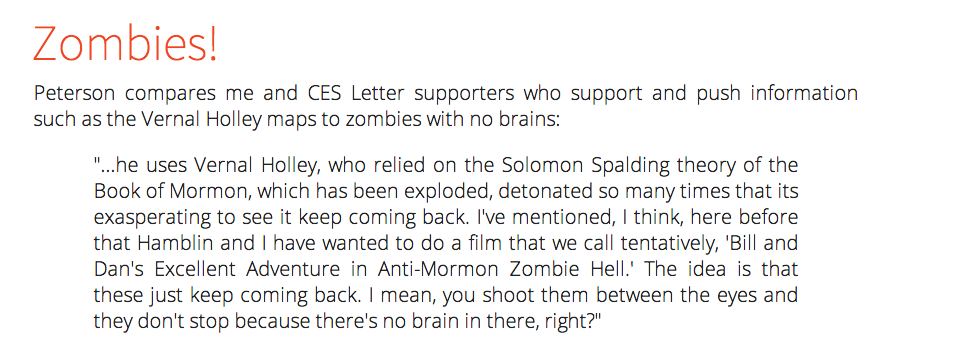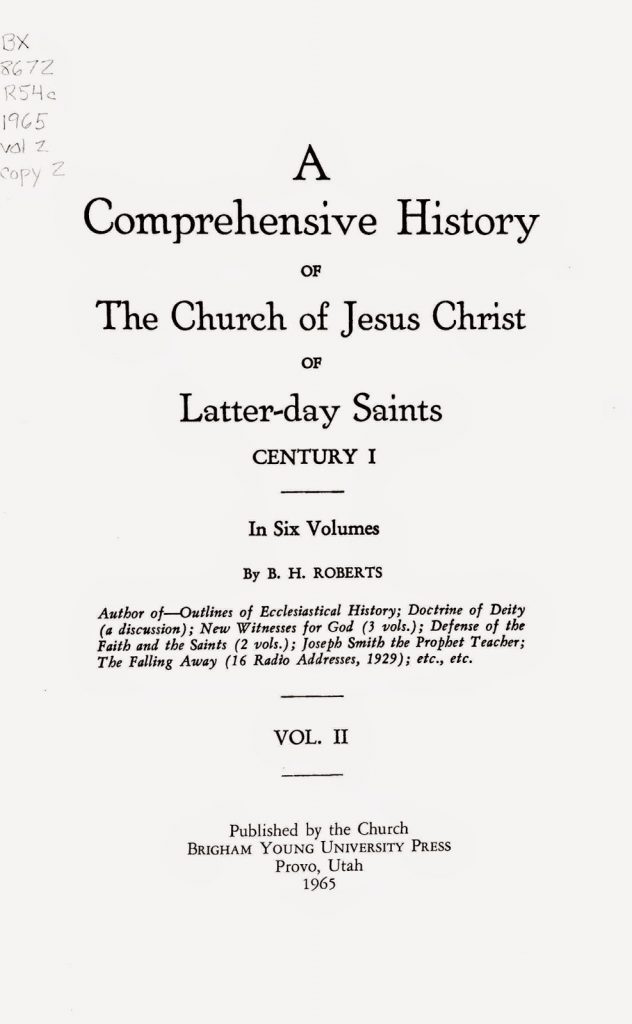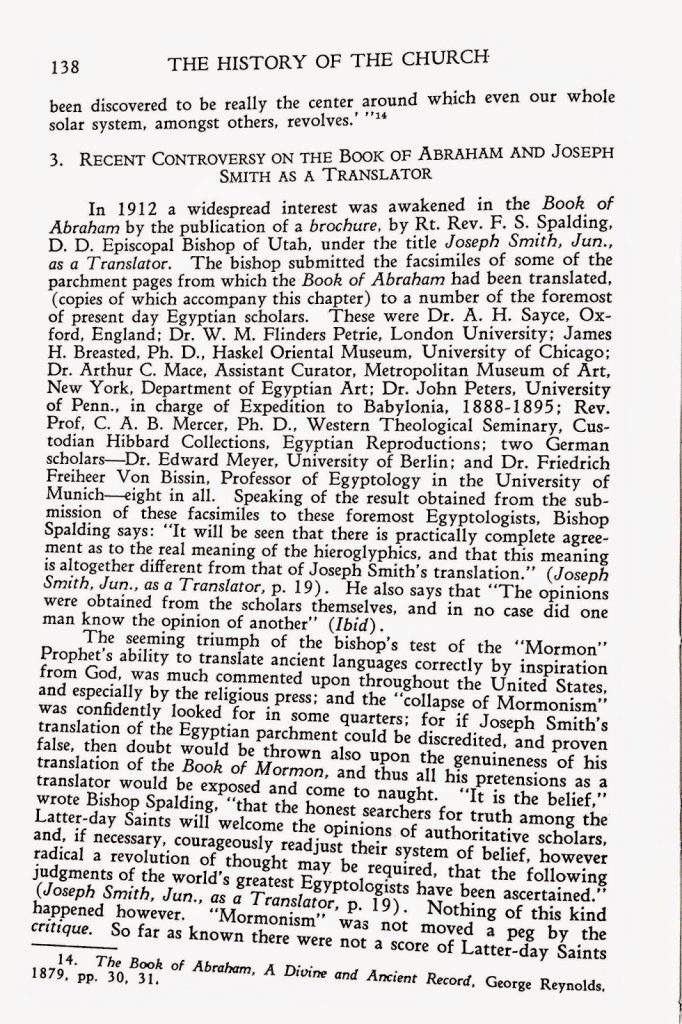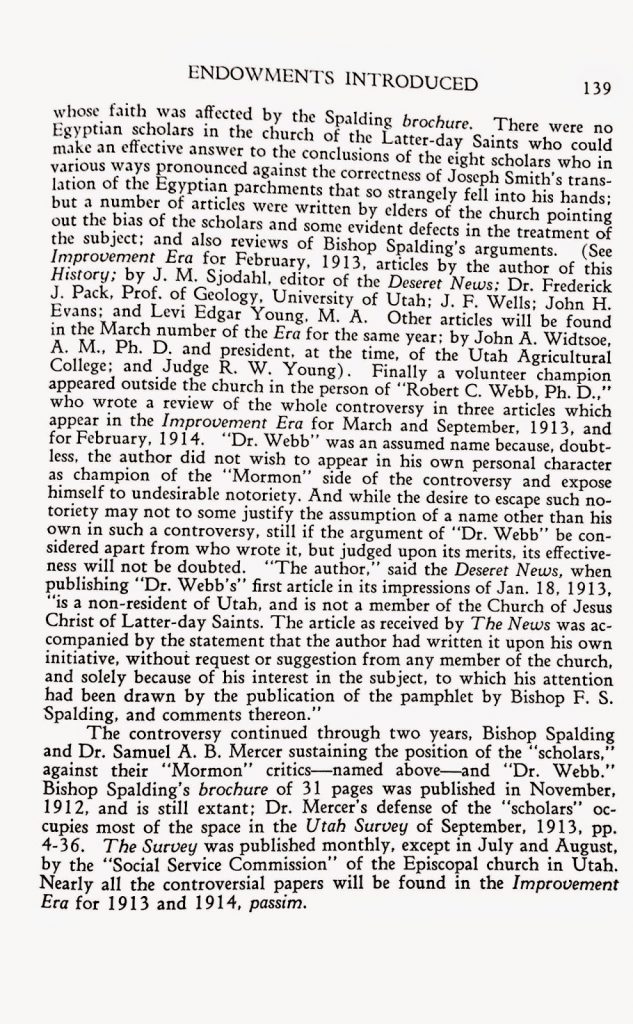Jeremy Runnells has a bad habit of misquoting people. As I showed on my blog a little while ago, he misquoted the printed endorsements of Brian Hales’ three-volume Joseph Smith’s Polygamy, for example. Most recently, he has misquoted both a dead and a living Latter-day Saint apologist, namely, B. H. Roberts and Daniel C. Peterson.
Allow me to explain.
Runnells Misquotes Daniel Peterson
In his reply to Peterson’s 2014 FairMormon presentation “Some Reflections On That Letter To a CES Director,” Runnells begins his characteristically sarcastic and dismissive polemic with a complaint that Peterson is a nasty apologist (any surprise?) who resorts to such lowbrow tactics as calling ex-Mormons who disagree with him “zombies.” Runnells quotes Peterson as follows:
 |
I will, as advertised, reflect on “secular anti-Mormonism.” I’m grateful for the assignment because, frankly, anti-Mormonism of the evangelical kind has come, with a few exceptions, to bore me intensely. It’s not only that it tends to be repetitious and uninteresting–I think I’ve mentioned here before the film that my friend Bill Hamblin and I have laughed about doing: Bill and Dan’s Excellent Adventure in Anti-Mormon Zombie Hell. It’s not merely that the same arguments reappear ad nauseam, no matter how often they’ve been refuted, and that reviewing essentially the same book for the thirty-second time grows tiresome. (You’ve heard the definition of insanity as when you keep doing the same thing over and over and over again, and expect to get different results.) It’s also the deep streak of intellectual dishonesty that runs through much of the countercult industry, the triumphalism that exaggerates and even invents problems on the Mormon side while effectively pretending that no problems remain to be addressed on the so-called “Christian” side.
Anti-Mormonism of the evangelical kind has come, with a few exceptions, to bore me intensely. It is not only that it tends to be repetitious and uninteresting. (My friend and colleague William Hamblin and I have laughed about doing an autobiographical film entitled Bill and Dan’s Excellent Adventure in Anti-Mormon Zombie Hell.) It is not merely that the same arguments reappear ad nauseam, no matter how often they have been refuted, and that reviewing essentially the same book for the thirty-second time grows tiresome.
I have joked about the film that my colleague William Hamblin and I want to produce: Bill and Dan’s Excellent Adventure in Anti-Mormon Zombie Hell. Like others who occasionally feel called upon to survey the dreary precincts of the fundamentalist anti-Mormon demimonde, we are growing tired of the tendency—very widespread among these crusading ministries and publications—endlessly to repeat arguments that have been answered years ago, to ignore counter evidence and opposing interpretations, to proceed in blissful and sometimes even defiant ignorance of crucial data.
 |
In 1912 a widespread interest was awakened in the Book of Abraham by the publication of a brochure, by Rt. Rev. F. S. Spalding, D. D. Episcopal Bishop of Utah, under the title Joseph Smith, Jun., as a Translator. The bishop submitted the facsimiles of some of the parchment pages from which the Book of Abraham had been translated, (copies of which accompany this chapter) to a number of the foremost of present day Egyptian scholars. . . . Speaking of the result obtained from the submission of these facsimiles to these foremost Egyptologists, Bishop Spalding says: “It will be seen that there is practically complete agreement as to the real meaning of the hieroglyphics, and that this meaning is altogether different from that of Joseph Smith’s translation.” (Joseph Smith, Jun., as a Translator, p. 19). He also says that “The opinions were obtained from the scholars themselves, and in no case did one man know the opinion of another” (Ibid). The seeming triumph of the bishop’s test of the “Mormon” Prophet’s ability to translate ancient languages correctly by inspiration from God, was much commented upon throughout the United States, and especially by the religious press; and the “collapse of Mormonism” was confidently looked for in some quarters; for if Joseph Smith’s translation of the Egyptian parchment could be discredited, and proven false, then doubt would be thrown also upon the genuineness of his translation of the Book of Mormon; and thus all his pretensions as a translator would be exposed and come to naught. “It is the belief,” wrote Bishop Spalding, “that the honest searchers for truth among the Latter-day Saints will welcome the opinions of authoritative scholars, and, if necessary, courageously readjust their system of belief, however radical a revolution of thought may be required, that the following judgments of the world’s greatest Egyptologists have been ascertained.” (Joseph Smith, Jun., as a Translator, p. 19).
Nothing of this kind happened however, “Mormonism” was not moved a peg by the critique. So far as known there were not a score of Latter-day Saints whose faith was affected by the Spalding brochure. There were no Egyptian scholars in the church of the Latter-day Saints who could make an effective answer to the conclusions of the eight scholars who in various ways pronounced against the correctness of Joseph Smith’s translation of the Egyptian parchments that so strangely fell into his hands; but a number of articles were written by elders of the church pointing out the bias of the scholars and some evident defects in the treatment of the subject; and also reviews of Bishop Spalding’s arguments.
 |


